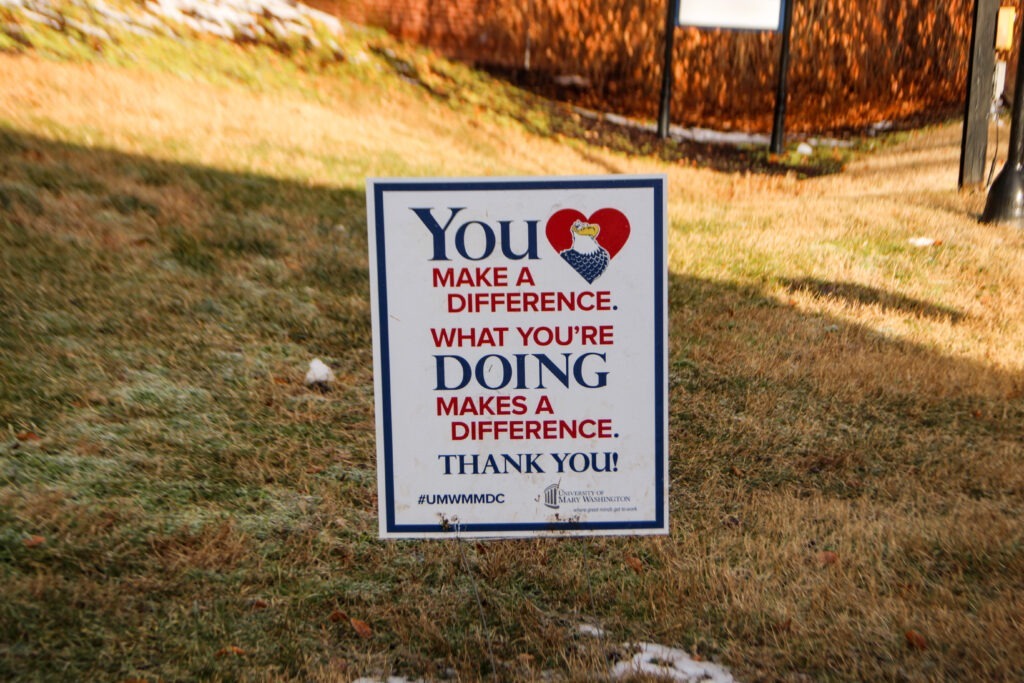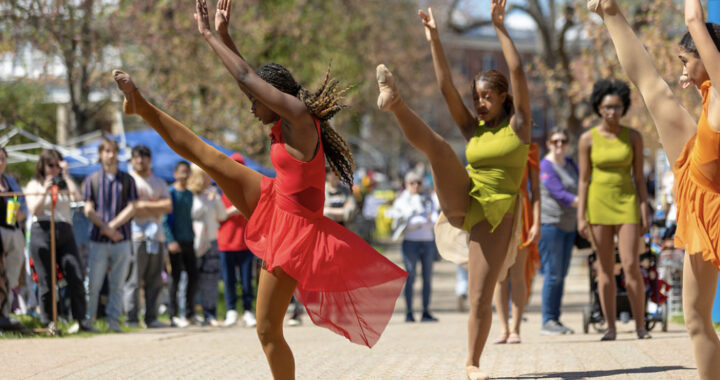COVID conditions are worse than fall 2020 semester
4 min read
A sign of encouragement about COVID practices stands outside of the Simpson Library. | Matthew Simmons, The Blue and Gray Press
by PRIYA PATEL
Staff Writer
There has been an increase in COVID-19 cases since the relative success last fall semester.
On Feb. 12, an email was sent out to University of Mary Washington students conveying the concerns the university’s COVID-19 co-coordinators have about this semester. Students were told that there were more people in quarantine and isolation on the day that email was sent than at any time last semester. The co-coordinators also mentioned the threat of new variants of COVID-19 spreading across Virginia and recent surges in other Virginia colleges, some of which were forced to go remote. They asked that students continue to follow the health guidelines of monitor, mask, distance, clean, in hopes that students can remain on campus.
“Getting that email did worry me because, while I’m online this semester, I still have friends who live on campus and who are in person, and I’m concerned for their well-being,” said Megan Allen, sophomore political science major. “It’s also alarming because I was hopeful after last semester’s relative success that it would carry into this semester, which would make it more viable for me to return to campus and do classes in person, but now I feel we’ve been set back yet again.”
In the fall 2020 semester, there were only 48 cumulative cases of COVID-19 found among University of Mary Washington students and employees. During the spring semester, according to cumulative counts on the UMW COVID-19 Dashboard starting Jan. 1, there have been 36 cumulative cases as of Feb. 23.
“What we’ve seen here and around the Commonwealth is a bit of an increase in cases, especially this early in the semester,” said Dr. Timothy O’Donnell, Associate Provost for Academic Engagement and Student Success and one of the University of Mary Washington’s COVID-19 co-coordinators. “That could be due to a number of factors including the fact that most schools in Virginia are doing a lot more testing than in the fall, including required entry-testing.”
“Most people just don’t care anymore because of how long things have been like this, as dumb as that is, and this is not aided by the vaccines because nearly everyone I know who is vaccinated immediately stopped caring about COVID despite explicit warning that they still need to take it seriously,” said Alexander Regan, junior political science major.
The university will not shut down if cases increase.
“There is always concern, but one of the things we learned in the fall is that this may not be the best approach because sending students home risks spreading the disease further,” O’Donnell said. “As always, we will consult with and listen to our local public health and healthcare officials, as well as the direction of the Virginia Department of Health and the Governor.”
Some students believe that the university should not have opened again for the spring semester.
“I agree that sending students home might not be the best because they could spread it to their families,” said Mika Clincy, junior political science major. “But that’s why it was so imperative for the administration to have taken more care when deciding to bring the students back in the first place.”
Allen agreed with Clincy’s criticism of the university’s decision.
“I think that was something they should have considered before bringing us back,” Allen said. “I agree that shutting down and sending us back home wouldn’t be wise with the uncertainty, but we knew about potential new strands before the semester had even started.”
Students have been encouraged ever since last fall to follow protocols to minimize transmission of the virus.
“I should say, our students have for the most part really done a great job of taking this seriously and following MMDC protocols,” O’Donnell said.
However, Regan believes this is not always the case.
“The student body does a pretty awful job for the most part and I’d wager we are following it even less than the administration thinks we are, nobody listens to the ‘one person’ elevator rules, for example,” Regan said.
Several new and more transmissible variants of the virus have come about since the fall and are now making their way through Virginia. This is one of the concerns of many colleges that would like to remain open, including the University of Mary Washington.
“We have no knowledge of new variants or strains on our campus, although we’ve heard that we should expect them to be here in the coming weeks,” O’Donnell said. “Part of the reason we have so little knowledge is that we are not well prepared as a nation to do the sequencing required to more closely monitor. Some of that capacity is just now spinning up in Virginia.”
After learning about the concern of the COVID-19 co-coordinators, many students are wondering what will happen next.
“Should things worsen considerably, we have and continue to refine contingency plans,” O’Donnell said. “Ultimately, it will depend on the circumstances and what UMW’s COVID-19 team thinks best addresses the situation in which we find ourselves.”











